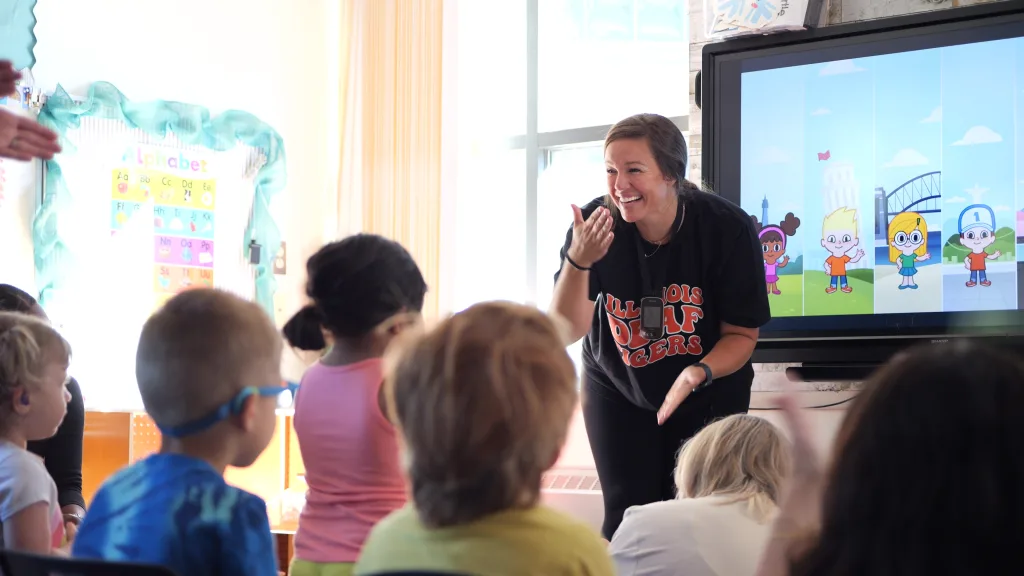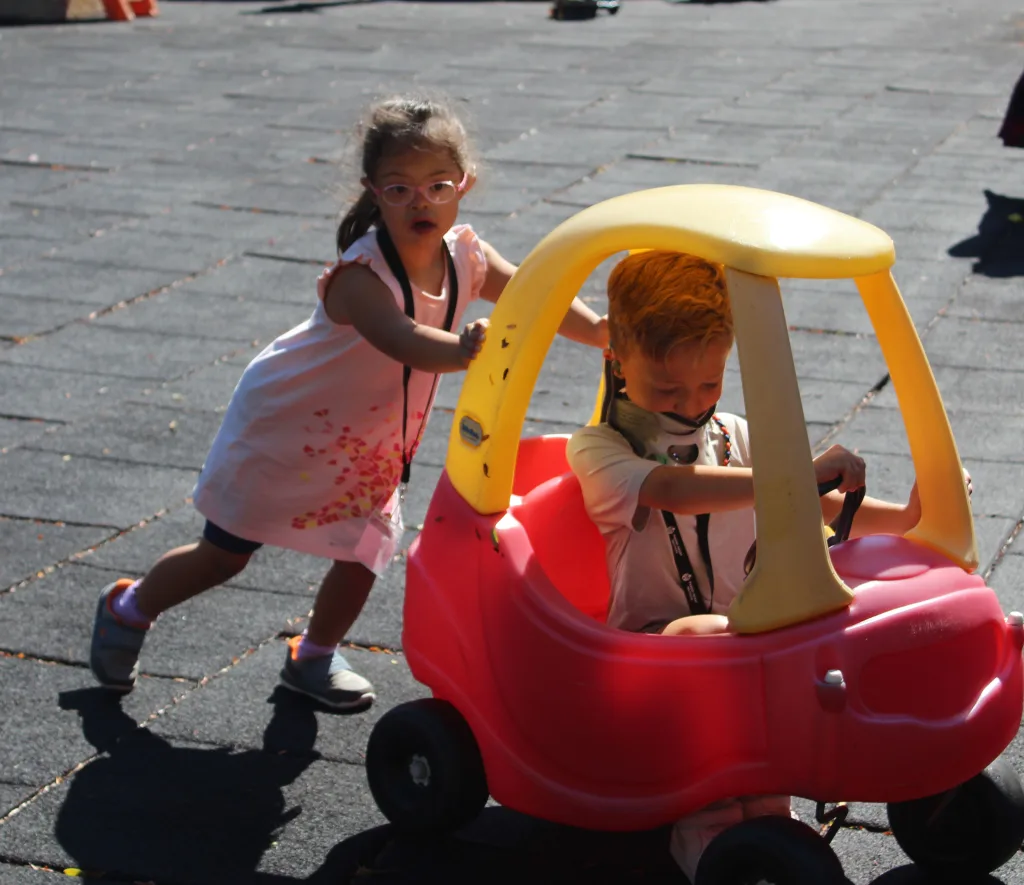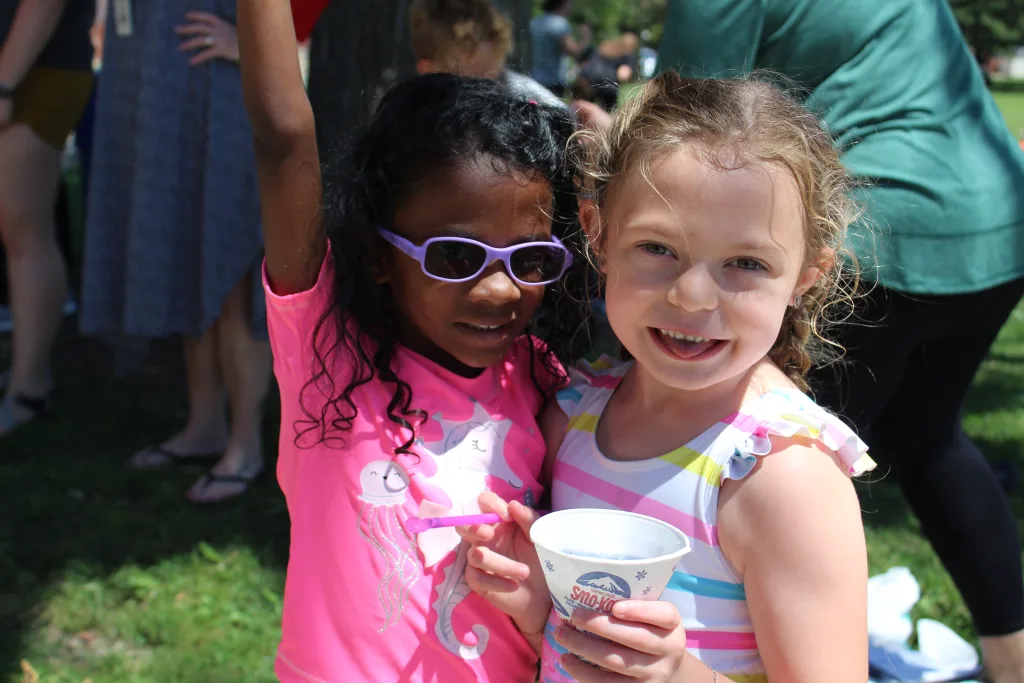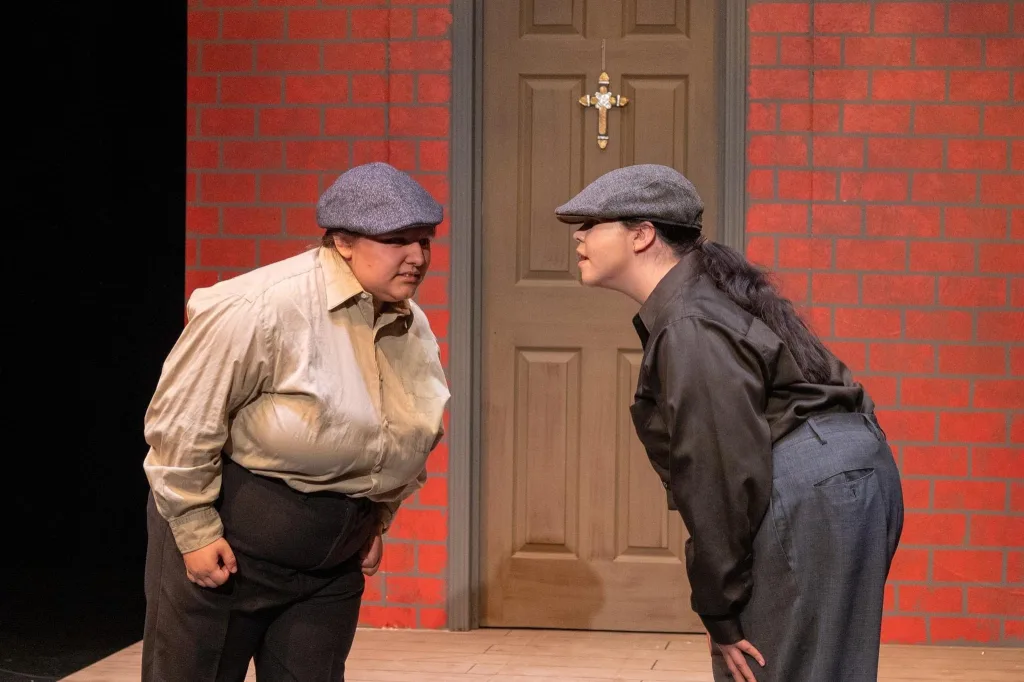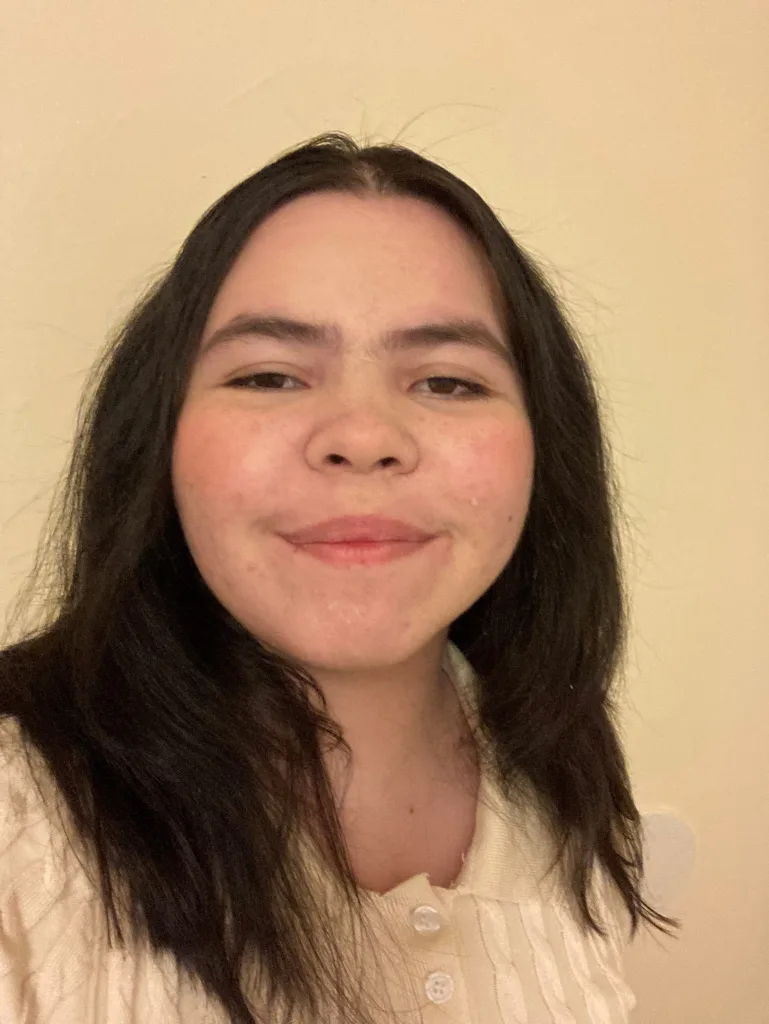NurseNet Simplifies the Search for In-Home Nursing
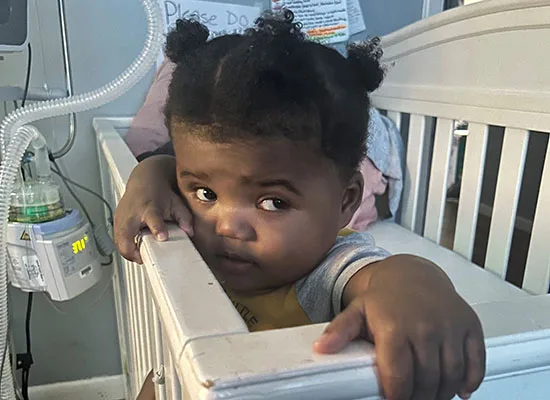
Home Care Program parent praises NurseNet as an easy way to find available nurses in your area
The search for in-home nurses can be exhausting for many families of loved ones with complex medical needs.
Home Care Program parent Shekia Wright understands this challenge.
She recently tried NurseNet to find available nurses for her 1-year-old son, Kaharri Pittman (pictured above). He has a tracheostomy and relies on a ventilator to breathe.
Shekia set up a NurseNet account and entered Kaharri’s nursing needs.
She quickly found two available matches from two different nursing agencies. Overall, she was impressed with how easy NurseNet is to use.
“It was easy to set up the account and easy to find available nurses,” Shekia said. “I would recommend NurseNet to any families looking for nursing.”
NurseNet is a new tool that makes it easier for families to find the in-home nursing care their child needs. We created NurseNet to be an online resource that connects families with available in-home nursing providers throughout Illinois.
Families can use NurseNet to share their nursing needs. Nursing agencies that are enrolled with the Division of Specialized Care for Children (DSCC) can see this information and contact families if they have available nurses who match the child’s care needs.
Nursing agencies can also use NurseNet to share information about where nurses are available.
This information can help families find suitable nursing care. It can also help nursing agencies identify opportunities to serve families.
How NurseNet Helps Families
- Easy Access: NurseNet is available 24/7, giving you the flexibility to search for nursing providers at your convenience.
- Comprehensive Listings: The tool includes a wide range of in-home nursing providers across the state, ensuring you have multiple options to choose from.
- Direct Connection: You can contact nursing providers directly through NurseNet, making the process of securing care for your child quicker and more straightforward.
How to Get Started
We encourage you to visit our NurseNet page and explore this new tool. There you’ll find guides and how-to videos to help you get started.
If you have problems accessing NurseNet, please send an email to dsccexternalhelp@uic.edu.
You can also talk to your DSCC Care Coordinator to help you get started. Your Care Coordinator can assist with the sign-up process during your next home visit.
We understand how important it is to have reliable, skilled nursing care for your child. We believe NurseNet will significantly improve your ability to find the support you need!
Podcast Highlights DSCC’s Role in Policy Solutions for Children with Complex Care Needs During Emergencies

The MCH Bridges podcast shares the story of how DSCC partnered with parent advocates and state agencies to allow generators to be an MFTD waiver benefit
In August 2020, a powerful windstorm called a derecho struck Illinois.
The storm produced about 15 tornadoes in the Chicagoland area and caused widespread power outages. Many people were without power for multiple days.
After the storm, parent advocate Susan Agrawal compiled feedback from Home Care Program families about how the power loss affected their children and loved ones with complex medical needs. She then shared this feedback with the Division of Specialized Care for Children (DSCC).
DSCC operates the Home Care Program on behalf of the Illinois Department of Healthcare and Family Services (HFS). The Home Care Program serves individuals who need in-home nursing to safely live at home.
Many of these individuals are enrolled in the Medicaid Home and Community-Based Services Waiver for Those Who Are Medically Fragile and Technology Dependent (MFTD waiver). These individuals often have tracheostomies, ventilators, gastrostomy tubes and other medical technology that depends on electricity.
The feedback Agrawal shared showed that many Home Care families wanted the ability to use MFTD waiver funds to pay for power generators for their homes.
DSCC took this feedback, did research and worked with HFS to pursue an amendment to the MFTD waiver to allow waiver funds to cover the cost of generators.
A recent episode of the MCH Bridges podcast tells the story of how this new waiver benefit became available for families. The podcast is from the Association of Maternal and Child Health Programs (AMCHP).
Dr. Molly Hofmann, DSCC’s Director of Care Coordination, Systems Development and Education, co-hosted the episode called “Generating Policy Solutions to Protect Children with Complex Health Care Needs During Emergencies.”
The episode highlights the importance of preparedness, especially in the face of natural disasters or power outages that can severely affect the care of children who are medically fragile and technology dependent.
It features the following DSCC team members and partners:
- Stephanie Leach, DSCC’s Associate Director of Systems of Care
- Courtney Kerfoot, DSCC’s Integrated Program Support Specialist
- Susan Agrawal, parent advocate, Director of the Family-to-Family Health Information Center at The Arc of Illinois and the founder and leader of MFTD Waiver Families in Illinois
- Pam Winsel of the Illinois Department of Healthcare and Family Services
Thank you to AMCHP for highlighting our efforts and partnerships to ensure children with complex medical needs have the life-saving technology they need in emergency situations!
You can learn more about how the MFTD waiver pays for home generators and other important benefits for Home Care families on our Waiver Services for Home Care Families page.
Listening Sessions to Gather Input on HealthChoice Illinois
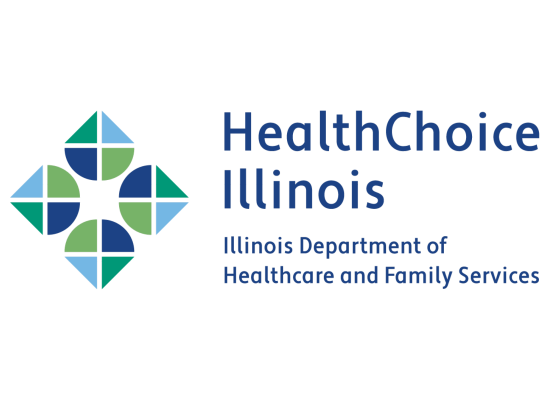
HFS invites families to participate in listening sessions to share feedback on HealthChoice Illinois managed care
The Illinois Department of Healthcare and Family Services (HFS) wants to hear about your experience with HealthChoice Illinois managed care.
The agency is holding in-person and virtual listening sessions to gather feedback from HealthChoice Illinois customers, providers, advocates and other stakeholders.
You can share your experiences, suggest improvements and also provide written feedback through an online form.
Most Medicaid customers are part of HealthChoice Illinois. You’re a HealthChoice Illinois customer if you selected a managed care organization after you joined Medicaid.
HFS wants to know:
- What works well for you with HealthChoice Illinois?
- Where do you see opportunities to improve?
- How else can HFS and HealthChoice Illinois meet your needs?
There are several ways you can share your input:
In-Person Listening Sessions
- Chicago
- Date and time: Thursday, Sept. 12, from 1 to 4 p.m.
- Location: College of Pharmacy, 833 S. Wood St. in Chicago, Room 134-3
- Link to register for Chicago session
- Springfield
- Date and time: Tuesday, Sept. 17, from 1 to 4 p.m.
- Location: John Block Building Auditorium, Illinois Department of Agriculture, 801 E. Sangamon Ave., on the Illinois State Fairgrounds at Gate 11
- Link to register for Springfield session
Virtual Listening Sessions
HFS will also take comments during its virtual Medicaid Advisory Committee (MAC) and Subcommittee meetings on:
- Sept. 24
- Oct. 3
- Nov. 1
Visit the HFS website for details and registration information.
Written Feedback
If you’re unable to attend a listening session, the HFS website also has an online form to provide written feedback.
HFS will accept feedback through Nov. 15, 2024.
Why Your Feedback is Important
HFS is preparing to procure new HealthChoice Illinois managed care contracts. Your input will help HFS better serve enrollees by improving access and quality within the Illinois Medicaid program.
If you are a Division of Specialized Care for Children (DSCC) participant, the listening sessions are also a good opportunity to share your families’ experience working with DSCC.
We partner with HealthChoice Illinois managed care organizations through contracts to provide care coordination services for their members.
More details about the procurement process are on the HFS website.
Share Your Feedback on Key MFTD Waiver Updates to Strengthen Support for Families
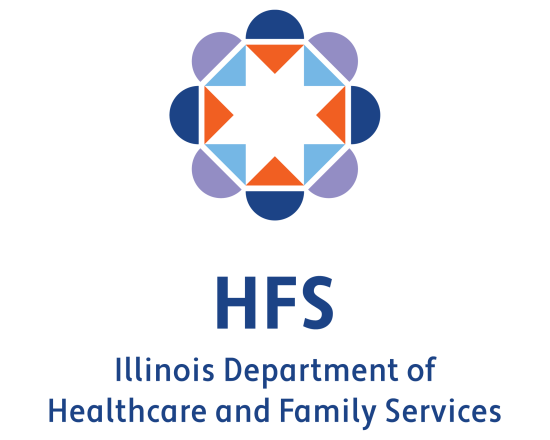
Families have through Sept. 28, 2024, to share input on waiver amendments allowing CNAs to become paid family caregivers and nursing rate increases.
Families have an opportunity to share feedback on several significant updates to the Medicaid Home and Community-Based Services Waiver for Those Who Are Medically Fragile, Technology Dependent (MFTD waiver).
The Illinois Department of Healthcare and Family Services (HFS) is the Medicaid agency responsible for the MFTD waiver. Many families in the Home Care Program have children who receive services through this waiver.
HFS is currently seeking approval from the federal Centers for Medicare and Medicaid Services (CMS) for waiver amendments that will:
- Allow parents who are certified nursing assistants (CNAs) to be paid family caregivers
- Increase rates for in-home nurses and CNA services
Read below for more details about these amendments and how to share your input.
CNAs as Paid Family Caregivers
Plans are underway to allow parents/legally responsible adults (LRAs) to become paid caregivers if they are a CNA and employed through a nursing agency.
Currently, parents/LRAs are paid for providing skilled nursing services to their children if they hold an active registered nurse (RN) or licensed practical nurse (LPN) license. This rule applies to parents/LRAs of all children approved for Home Care services, regardless of the child’s age. (Read more about our efforts to make paid licensed family caregivers a permanent benefit.)
Allowing parents and caregivers who are CNAs to become paid caregivers is an important step in strengthening our support for families of individuals who need in-home shift nursing.
This update would give more parents/LRAs the opportunity to earn payment for the caregiving they provide their children at home.
This change requires an amendment to the MFTD waiver as well as the creation of a new state plan amendment.
Nursing Rate Increase
HFS is also proposing a 7 percent rate increase for in-home nurses and CNA services to take effect on Jan. 1, 2025.
This rate increase would affect:
- RN, LPN and CNA care
- In-home and facility-based respite care
- Nurse training rates
The proposed rates are as follows:
- RN, $57.78 per hour
- LPN, $48.15 per hour
- CNA, $32.10 per hour
We hope this rate increase can help make more high-quality nursing options available for our participant families.
Transitional Care Services provided outside the home (not an MFTD waiver service) is expected to have a rate increase from $950 to $1,300 a day. This increase would also take effect on Jan. 1, 2025.
Other Key Updates in the Amendment Include:
- Adds adaptive equipment and assistive technology as new services.
- Makes pest control a post-approval process. This change means families will not need to receive prior approval for pest control services.
- Makes the Division of Specialized Care for Children (DSCC) the entity responsible for the prior approval for home accessibility modifications, vehicle modifications, medical equipment operating expenses, adaptive equipment, placement maintenance counseling and assistive technology.
- Removes the requirement of two bids if the cost exceeds $2,000 for waiver services. This change is necessary to help increase access to services.
Share Your Feedback
The public comment period for these proposed waiver amendments is now open.
To review the full list of proposed waiver updates, you can:
- Review a hard copy at HFS’ offices at:
- 201 South Grand Ave. E.,
Springfield, IL 62763 - 401 S. Clinton
Chicago, IL 60607
- 201 South Grand Ave. E.,
The deadline to provide feedback is Sept 28, 2024.
You can share your feedback in two ways:
- Via email to HFS.HCBSWaiver@illinois.gov
- Via mail to the Illinois Department of Healthcare and Family Services, Attention: Waiver Operations Management, 201 South Grand Ave. E., 2FL, Springfield, IL 62763
This public comment process is one of the best ways you can have your voice heard.
HFS will send your comments to the federal CMS as part of the waiver approval process.
If you have questions, please contact HFS’s Waiver Operations Management Unit at (217) 524-4148 or (844) 528-8444.
In-Depth Simulated Training in Chicago for Families and Caregivers of Children with Complex Medical Needs
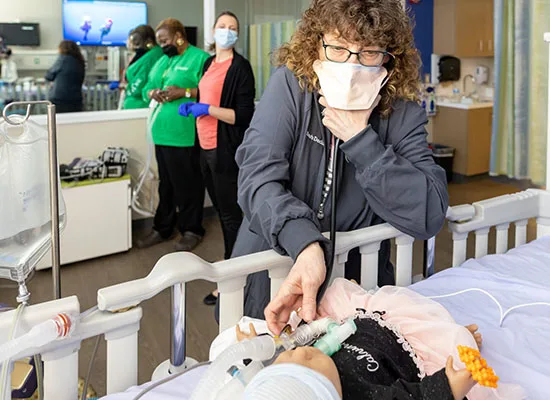
This free in-person training will take place Sept. 24-25 at UIC’s Simulation and Integrative Learning Center in Chicago.
Registration is now open for a special in-person training program for the families and caregivers of children with complex medical needs.
This free two-day training will take place Tuesday, Sept. 24, and Wednesday, Sept. 25, at the University of Illinois Chicago Simulation and Integrative Learning (SAIL) Center on the fifth floor at 1220 S. Wood St. in Chicago.
Families have shared the need for more support for parents/caregivers of children with complex medical needs. We are excited to partner with Almost Home Kids to provide this valuable training opportunity. It will offer essential tools and knowledge to help you in your caregiving journey.
You may attend this training if you:
- Are the parent or caregiver of a child in the Home and Community-Based Services Waiver for Those Who Are Medically Fragile Technology Dependent (MFTD waiver)
- Have prior experience in caring for a child with a tracheostomy (trach) tube and/or a child with a trach tube and ventilator
- Are able to commit to online learning before the in-person learning days
- Can attend both dates to complete the training
The training will be from 8 a.m. to 4:30 p.m. each day. The in-depth curriculum will include:
- Reducing the risk of infection
- Skin care
- Daily care of the child with a tracheostomy and ventilator
- Activity and movement
- Equipment and alarms
- Gastrostomy care and feeding
- Tracheostomy basics
- Respiratory assessment and interventions
- Ventilator training with hands-on practice
- Emergency preparedness
- Caregiver resiliency and well-being
- Simulation learning experience
You can also see the Caregiver Simulated Training flyer for more details.
Please sign up online to participate in the training. There is no cost to attend.
For more information, contact Yolanda Rivera, Nursing Professional Development Specialist and Clinical Educator, at connect@almosthomekids.org or (630) 271-9155, ext. 114.
This training is part of our efforts to use federal funding from the American Rescue Plan Act to improve support and services for families of children with complex medical needs.
Almost Home Kids (AHK) provides a bridge from hospital to home through an innovative community-based care system for children with medical complexities. Its services include:
- Responding to the needs of families
- Training caregivers
- Advocating for accessibility and inclusion
- Educating healthcare professionals
Almost Home Kids has locations in Chicago, Naperville and Peoria.
Gain Resources and Strategies to Help Your Child Prepare for Adulthood
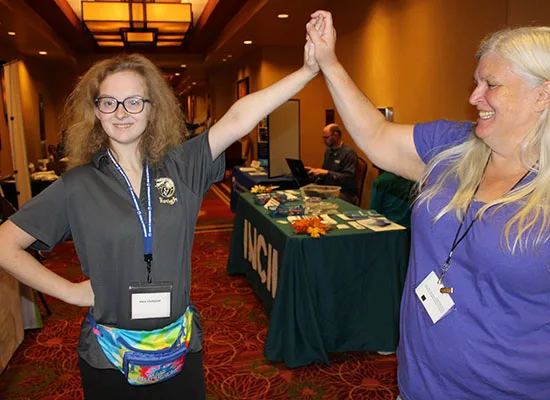
The 2024 Illinois Statewide Transition Conference is happening on Nov. 7-8 in Springfield
Luz Diaz said she struggled emotionally before attending the Illinois Statewide Transition Conference.
She felt isolated and unsure of the future for her daughter, Ariana, now 20. Ariana has cerebral palsy and quadriplegia along with hearing loss and developmental delays.
The knowledge she gained and the connections she made with other families during the 2023 conference immediately lifted her spirits. Luz now feels more hopeful for what lies ahead.
“Before I came here, I was depressed. I felt so lonely. Now that I’ve seen everything here, my thoughts have changed. I don’t feel lonely. I feel like I belong, and I feel like this is my family,” she said. “Now I feel like I’m not alone.”
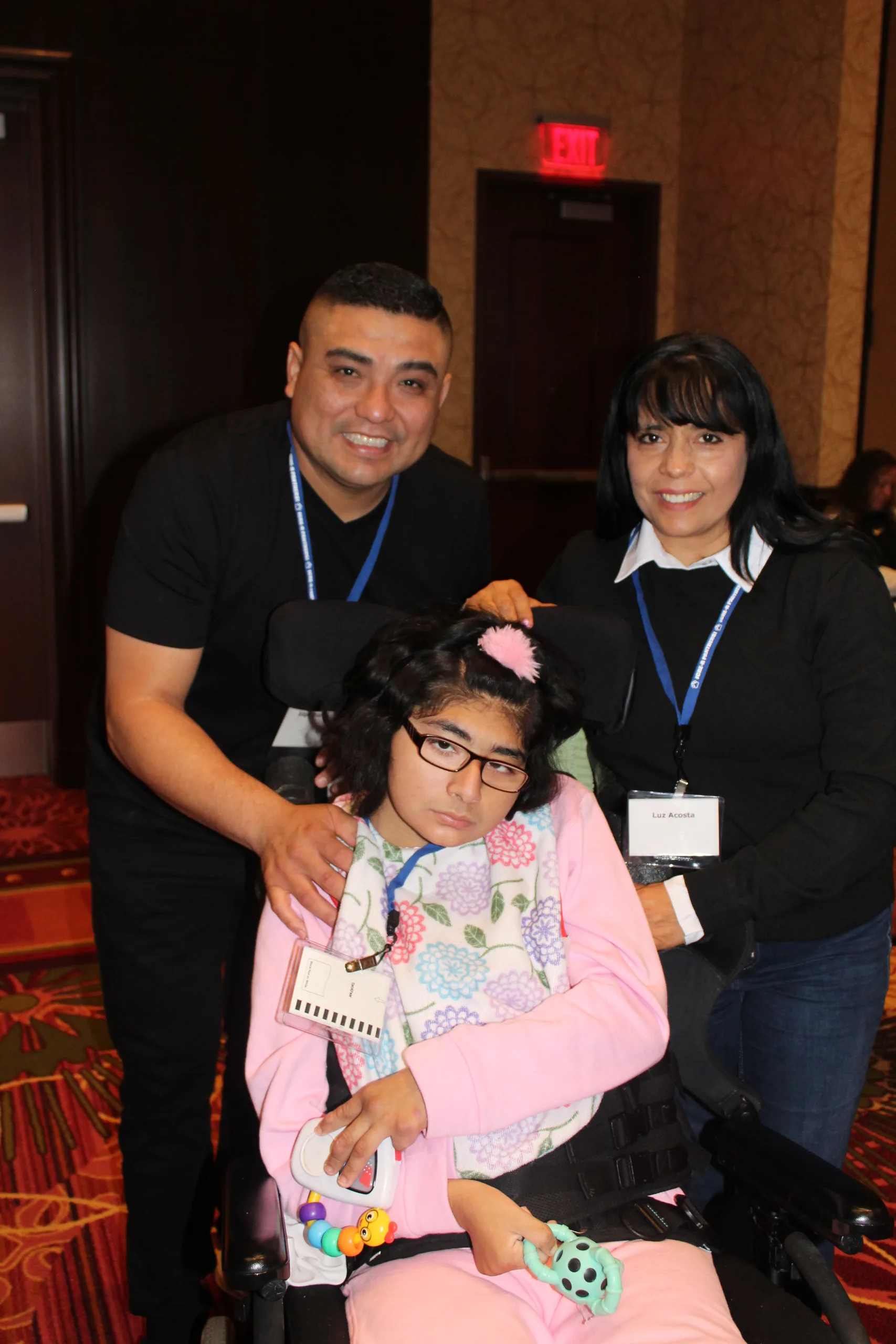
The Diaz family were among 370 people who attended the 2023 transition conference in person in Bloomington-Normal.
The conference, titled “Stepping Stones of Transition,” returns for 2024 at the Crowne Plaza in Springfield, Ill., on Nov. 7-8. This year’s event is in person only.
The conference highlights opportunities and resources available for youth and young adults with disabilities and complex medical needs as they transition to adulthood. It’s a “one-stop shop” for gaining valuable resources, making connections and learning alongside individuals who are on the same journey.
The “Stepping Stones of Transition” conference is for youth, parents, caregivers, vocational specialists, healthcare providers, educators and others who work with youth and young adults with disabilities.
Youth and young adults can visit vendors, attend workshops and learn how to plan for their future, including:
- What happens after I leave high school?
- How do I sort through the maze of resources?
- What steps can I take now to prepare for upcoming changes?
- What skills are important for me to develop?
Highlights for 2024 will include learning about supported decision-making from keynote speaker and self-advocate Derek Heard along with Allison Cohen Hall from the Center on Youth Voice, Youth Choice.
You can also attend sessions on:
- Self-determination
- Advocacy
- Employment
- Future planning
- Post-secondary education
- Health care
The Division of Specialized Care for Children (DSCC) helps sponsor the transition conference and serves on its steering committee. We also can pay for the conference-related expenses for our participant families to attend.
DSCC paid the conference-related expenses for 25 DSCC participant families to attend the 2023 conference that took place in Bloomington-Normal.
“An Amazing Opportunity to Learn and Connect”
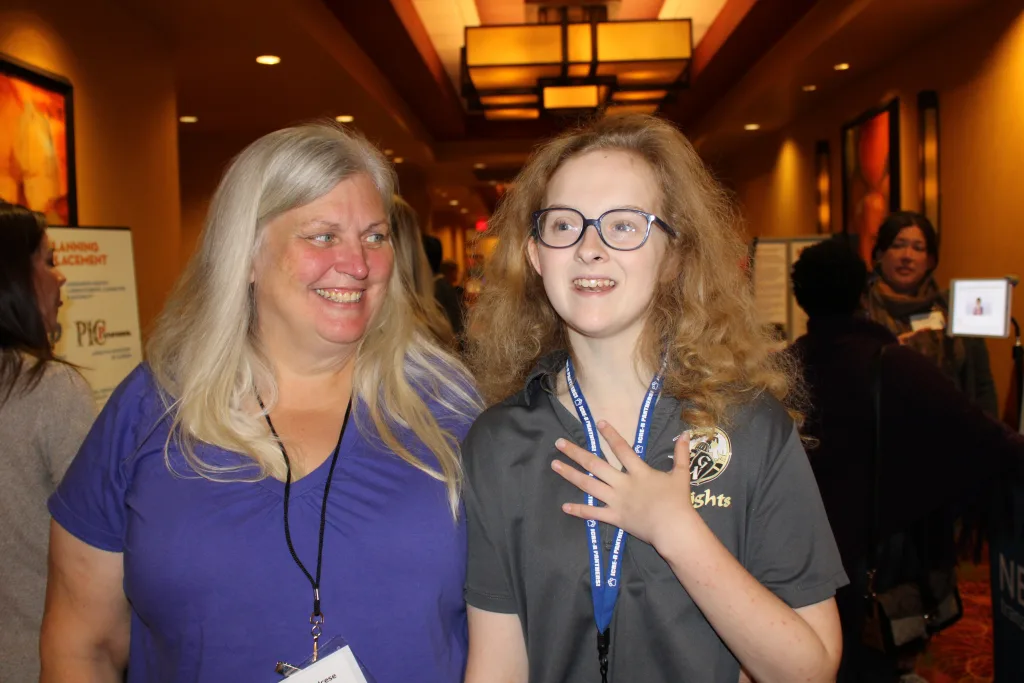
DSCC participant Vera Lynn Lindquist, 18, attended the transition conference both in 2022 and 2023. She has autism, attention-deficit hyperactivity disorder, anxiety disorder from childhood, tinnitus and hearing loss.
Vera enjoyed exploring the transition conference’s booths and sharing about the goals she has worked on.
“I know a lot more about autism awareness and speaking up and speaking out…” Vera said. “I’ve self-advocated at school. I reached out to my teacher on my laptop, I emailed him. I was behind on a lesson and let him know. He came and helped (me). It made all my teachers very happy.”
Vera attended the conference both years with her grandmother and legal guardian, Cheryl Calcese.
“We’ve used many of the independence and decision-making strategies we learned about,” Cheryl said. “Vera got a debit card. She has a money limit on it when she goes out for pizza and other group social events. She has an app on her phone to figure out the tax and tip. She adjusts everything according to her budget. She’s doing well with that and hasn’t gone over her budget once!”
The transition conference also gave Vera an opportunity to build her self-esteem and self-advocacy skills.
“She feels very comfortable at this conference, and it shows. She’s visiting with vendors and participating in sessions. Here her independence is shining. It’s very cool,” Cheryl said.
Cheryl also gained more resources and knowledge for herself.
“It’s always an amazing opportunity to learn and connect,” she said. “Thanks to the conference, I understand more about legal guardianship for adults and where to go for the paperwork for free or low-cost.”
Cheryl also learned more about the Americans with Disabilities Act (ADA).
“Vera and other students with disabilities had to miss their school homecoming,” she said. “In one of the sessions, I learned that the ADA covers social events. I connected with an organization that can help me make sure these students won’t miss their prom.”
Ariana’s mom, Luz, said she is grateful to everyone who organizes the conference so she can help give Ariana the best quality of life as she grows into adulthood.
Ariana’s father, Edgar, said he felt like the world was closing in on him before he attended the conference. By the end of last year’s event, he said he felt motivated after learning how conference speakers with disabilities advocated for themselves to have greater independence and a better quality of life.
Register and See the 2024 Schedule
The general public and professionals can visit the Statewide Transition Conference website to register and see more details.
For DSCC families, the conference schedule and more details are available:
- In English at: https://go.uic.edu/DSCC2024TransitionConferenceInfo
- In Spanish at: https://go.uic.edu/DSCC2024TransitionConferenceInfoSp
DSCC participants can register online:
- DSCC Transition Conference Sign-Up in English
- DSCC Transition Conference Sign-Up in Spanish
The deadline to register is Oct. 18. Please note that space is limited. Registration may close earlier if all spaces are filled.
Need financial help to attend?
If you are a DSCC participant family, we may be able to fund the conference-related expenses for your child and family, caregivers, nurse and/or personal attendant. These expenses include the cost of the hotel and transportation.
The Illinois Statewide Transition Conference Steering Committee has also set up a scholarship program to help youth with disabilities and their families attend the conference. The scholarship is open to:
- Individuals with disabilities
- Immediate family members of a person with a disability
- Guardians for a person with a disability
The amount of scholarship money available depends on each person’s needs.
Please fill out this scholarship form to apply. (The scholarship form is also available in Spanish.)
The deadline to apply for the conference scholarship is Oct. 18.
For more details or help with registration, please contact DSCC Title V Transition Specialist Claire Cook at (800) 322-3722, ext. 21812, or clairer3@uic.edu.
Families Gain Expert Guidance and Support Network for Raising Children with Hearing Loss
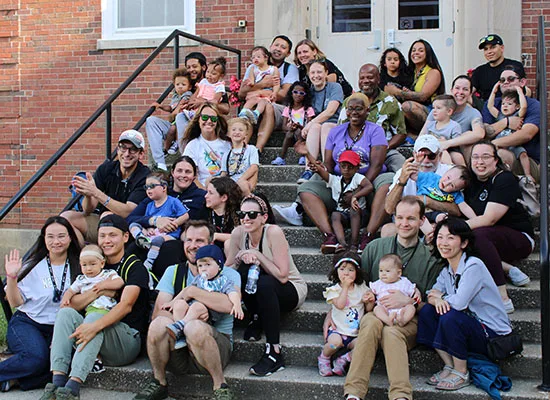
The 2024 Institute for Parents of Preschool Children Who Are Deaf or Hard of Hearing provided education and connection to 27 Illinois families.
Marcellus Weldon and his daughter, Mariana, were born with the same rare genetic disorder called Treacher Collins syndrome.
It affects the development of the head and face, including the ears.
“We don’t have any ear canal or any ear at all, on both sides. So, we’re profound to moderate deaf. It just happens at birth,” Marcellus explained.
He uses the analogy of a car to describe living with their disabilities.
“Growing up, I was the passenger, and my mother was the driver because she also has the same condition as me,” he said.
“Now that I’m the parent, I’m the driver and Mariana is the passenger. And we have to go through hills, valleys, twists and turns together. And there’s going to be things that I just can’t do with her.”
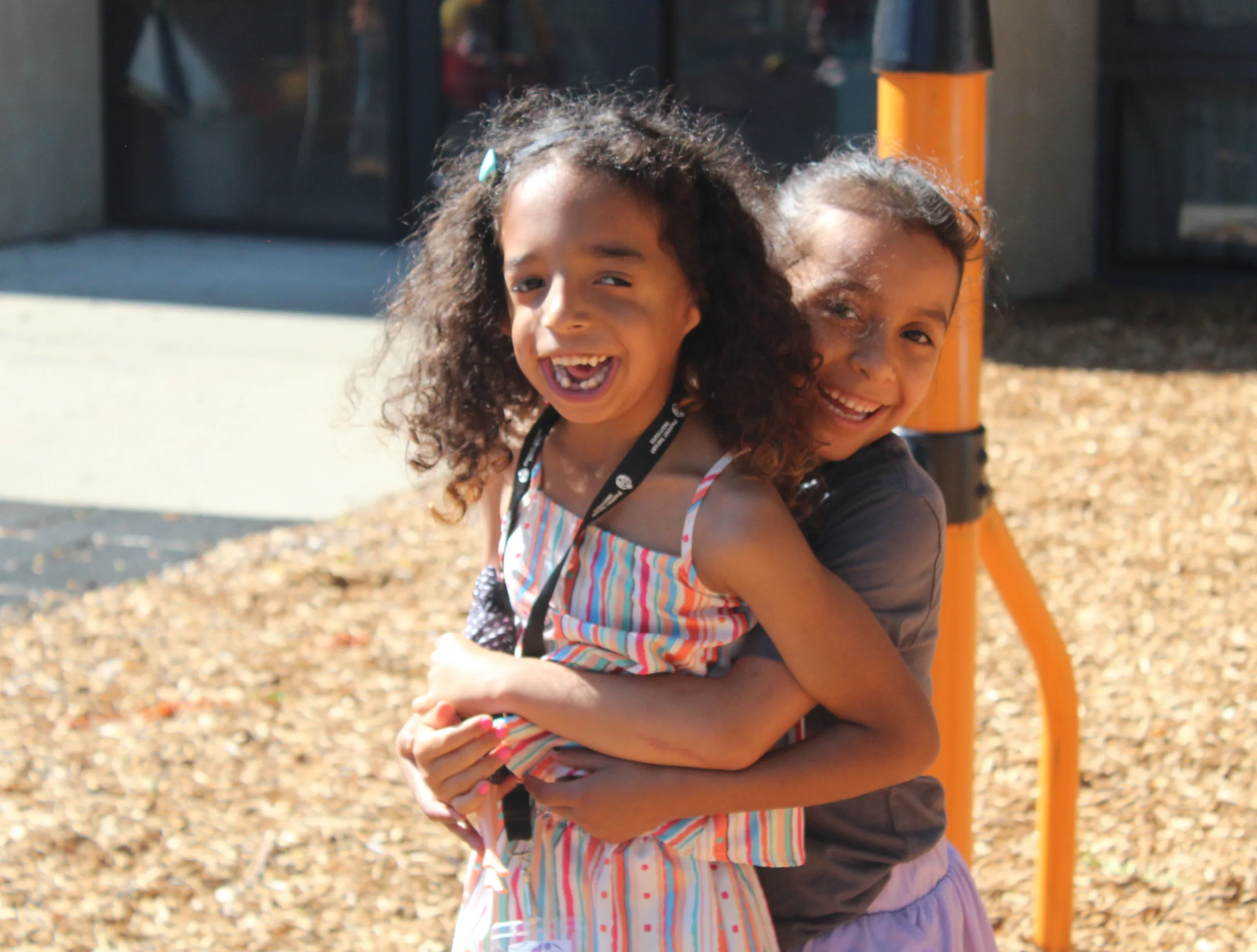
The desire to give Mariana, 6, the knowledge and tools necessary to be her own “driver” led the Weldon family to the 2024 Institute for Parents of Preschool Children Who Are Deaf or Hard of Hearing.
The Institute is a free, annual program for parents and caregivers of children ages 6 and under who have an identified hearing loss. It focuses on helping families find answers, build connections and access resources all in one place.
During the four-day program, Marcellus watched Mariana bond with other children. He also learned more about his family’s type of hearing loss, education options and how to best support Mariana through school and beyond.
“It’s nice for me to see her thrive not only academically but socially, and she’s just been blossoming like no other. And that’s a beautiful thing to see,” he said.
“She has a community. She has somewhere to go,” Marcellus continued. “She has resources that I never had — someone to fill up her tank, using that analogy.”
The Weldons were among 27 families from all over Illinois who attended this year’s Institute from June 13-16 on the Illinois School for the Deaf (ISD) campus in Jacksonville.
The University of Illinois Chicago’s Division of Specialized Care for Children (DSCC) supports the Institute, along with other sponsors.
“Parent Institute for me is exactly the soul and the heart of what DSCC’s mission is. You have our mission statement as partnering, helping and connecting. And this program is the epitome of what that is,” said Violet Wiker, DSCC’s Family Liaison who helps families enroll and prepare for the Institute.
Continue reading and watch the recap video below to for powerful parent and staff testimonials from the 2024 Institute:
Expert advice and guidance
The Institute provides valuable education and networking for children with hearing loss, their parents/caregivers and their siblings.
Participating parents and caregivers attend daily lectures by experts in the field to learn about raising a child with hearing loss. They also meet in small groups with professionals to discuss specific concerns and connect with other caregivers.
“They go through classes, they have educational experiences, they get to make friends that are people that are living their journeys and then interacting with the professionals that can give them great advice and guidance and expertise on how to go forward from here,” Violet said.
The children with hearing loss attend classrooms with experienced teachers of children who are deaf or hard of hearing. They play with one another and often develop deep friendships.
Each child also has the opportunity to receive hearing, vision, psychological, speech, language and educational evaluations.
“All of those are these amazing comprehensive reports that (families) can take with them out into their communities where they need those reports and those recommendations,” Violet said.
Siblings also attend and stay with their families in the ISD dorms. The siblings have their own teachers and take part in fun recreational activities.
“No one ever leaves disappointed and without fail, by the time we depart at the end after the graduation ceremony, people are always very grateful, glad that they came and they have taken away a lot of knowledge and information,” said Angela Kuhn. Angela is an ISD administrator who serves as the director for the Institute.
“They have really a connection with the staff here at the School for the Deaf and DSCC employees that lasts for a lifetime.”
“We understand each other”
Mayra Villarreal attended the Institute looking for knowledge, community and others who would understand her family’s situation.
Mayra’s daughter, Miliani “Mili” Carmona, 6, has a rare genetic mutation that causes progressive hearing loss. It also causes retinitis pigmentosa, a condition that affects the eyes and leads to gradual vision loss, as well as seizures and other neurological problems.
The Institute helped Mayra understand how Mili perceives the world.
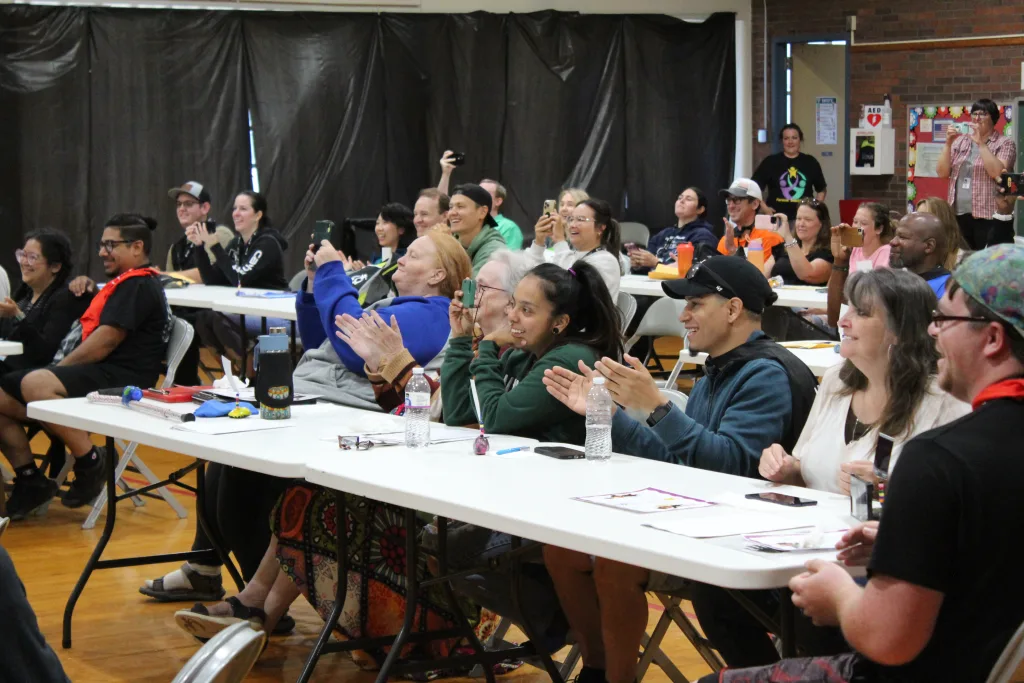
“The first thing that really hit a ‘wow’ moment for me was when we were doing the educational part about the hearing impairment, and they played that hearing loss simulation video. And hearing where she was, it was just surreal because you don’t really get it. You could try all you want to understand what your child’s going through, but you don’t get it unless you’re in it…” she said.
“It broke my heart. But it also made me understand her more… and see why things have been so hard for her.”
Mayra also found understanding for herself from both the Institute staff – many of whom have hearing loss themselves or are related to someone with hearing loss – and the other families.
“Everybody’s connected in some sort of way, and that’s why I feel like everybody here has such a passion for it,” Mayra said. “I’m lucky enough to take back these relationships that I have built with these parents because we might not be on the same journey, but we understand each other.”
Parent Megan Andresen and her 5-year-old son, Victor, are both deaf from Waardenburg syndrome.
“Coming into this I wanted to learn about my son’s behavior. Then I learned about implants and cued speech and different things, and it really opened my eyes.,” she said.
“The thing I think I’ll take away is as parents, whether we’re deaf or hearing, we have that same commonality because we do have deaf children, and it’s not different people in different groups,” she continued.
“It’s everybody really together, all coming here for the betterment of their children and to learn about their children.”
Sarah Dupuis’ daughter, Kimberly Pham, is 5 and was born with Down syndrome and mild to moderate hearing loss. As a special needs parent, Sarah said the opportunity to relate with other families is invaluable.
“Having a kid with special needs is so isolating. And to just be here with other families that face the same struggles… You’re sharing all of these stresses together, and it’s so cathartic,” she said.
Sarah and her husband, James Pham, also enjoyed the opportunity to immerse themselves in the classes and conversations without the distractions of day-to-day life back home.
“When you’re a parent of a child with special needs, you’re so overwhelmed all the time. And we just need resources, and it’s so hard to figure all those resources out by yourself,” Sarah said.
“You can come here, you can get the camaraderie with the other parents. You can learn about all kinds of things that you didn’t know about before. And it’s just so great. So, we’re really grateful for this.”
Inclusion and lifelong friendships
Lauren and Jonathan O’Brien traveled to the Institute with their daughter, Alannah, 7, and son, Josiah, 4.
Josiah has a genetic deletion on chromosome 15, which causes global delays with a bilateral hearing loss.
Alannah loved the sibling program and made a best friend with another girl in her group. Lauren and Jonathan also befriended the child’s parents.
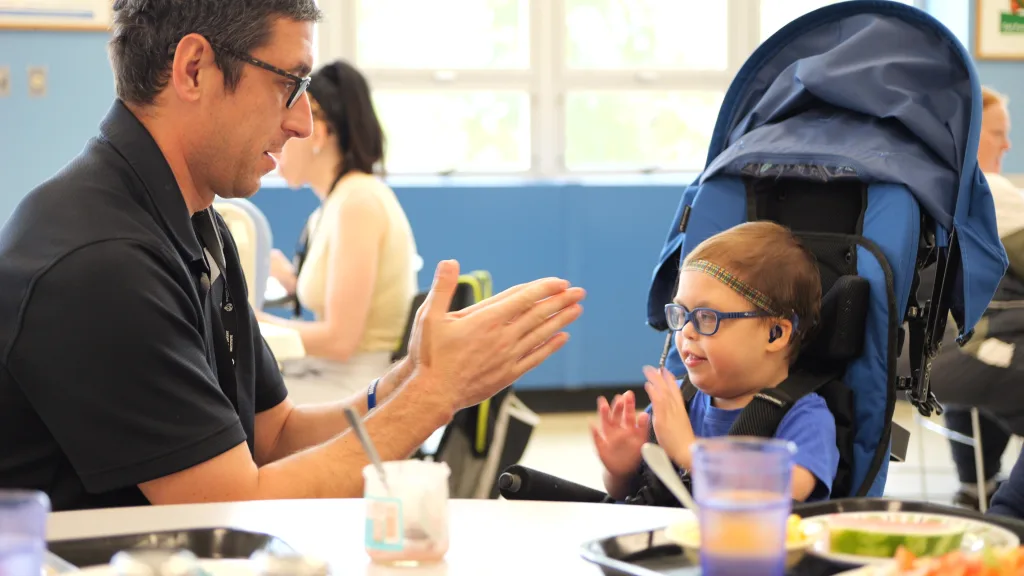
“I think the most important thing was for us to find a community because we are blessed to be in a really good school district with a deaf and hard-of-hearing community. But there’s not always kiddos that also have all their diagnoses going on. And so here, you not only have the Deaf culture, but there were other kiddos that had similarities to him cognitively,” Lauren said.
“It’s just been amazing for us to have the parent side of it and then to know that (Josiah)’s being seen by all of these top specialists in the field. And then (Alannah)’s having the time of her life with other siblings. It’s so special for all of us to be here together and to get this experience.”
Ramie Nauman’s daughter Alivia is 6 and has a fluctuating hearing loss along with other health conditions. They attended the Institute along with Alivia’s big sister, Malley, who is 19 and studying in the deaf and hard of hearing education program at Illinois State University
Alivia is mostly non-verbal and communicates through sign language. Up until attending the Institute, Ramie and Malley were the only ones who signed with Alivia outside of her school.
“She doesn’t have a lot of people to actually talk to all the time. So, we wanted for her to be able to talk to other kids and other adults. And we’ve heard about the school (ISD) and that everybody signs, and so, she’s been super excited,” Ramie said of preparing for the trip to ISD.
Alivia’s excitement only grew once she arrived on campus and could sign with everyone she met.
“I love to see her in her element, talking to the cook and talking to everybody. So, I think that’s been really fun to watch her be able to communicate with everybody here, which she’s never had before,” Ramie said.
“I feel like everything’s just way less scary because she knows, ‘OK, I can talk to anybody,’” Malley added.
Alivia’s Institute classmate Kingslee also benefited from that immediate sense of belonging, his grandmother Constance said.
Back home in the Collinsville area, Kingslee was the only deaf child in his class. Therefore, his exposure to sign language and communicating with other kids was minimal.
During the Institute, Kingslee formed fast friendships and didn’t want to leave his classroom.
“It’s like a family here. Like my grandmother always said, ‘It takes a village to raise a child.’ And I see this here is his village,” Constance said.
To families thinking about attending the Institute next year, Constance has a simple message.
“Come. If this is your state, come,” she said.
Learn more about the Institute
Visit our Facebook page to see an album of photographs from the the 2024 Institute.
In addition to DSCC, the following organizations supported this year’s program:
- Department of Human Services – Division of Rehabilitation Services
- Illinois School for the Deaf
- Illinois State Board of Education
- Illinois Department of Public Health
- Ann & Robert H. Lurie Children’s Hospital of Chicago
For more information about the Institute and how DSCC supports children with hearing loss, call (800) 322-3722 or email dsccinstitute@uic.edu.
Sensory-Friendly Hours and Programs for Families at the Illinois State Fair
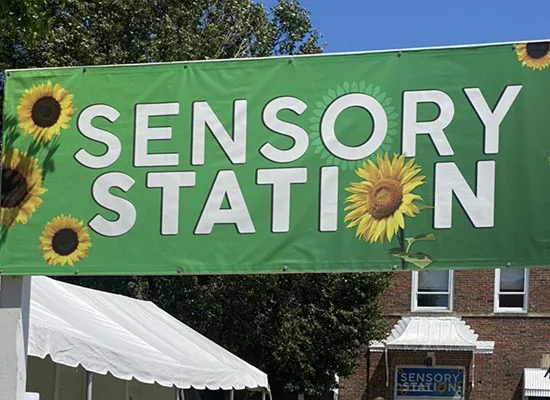
DSCC team members will be at the fair’s Sensory Station on Aug. 8-11 and help during special sensory-friendly Sunflower Hours on Aug. 10
We understand the importance of having inclusive and accessible activities for children and families available in local communities. We are excited to help support the Illinois State Fair’s sensory-friendly efforts next month.
The 2024 Illinois State Fair is happening in Springfield from Aug. 8-18.
Our Division of Specialized Care for Children (DSCC) team members from central Illinois will help staff the fair’s Sensory Station. The fair is also offering sensory-friendly Sunflower Hours and other programming to make the fair a more comfortable and enjoyable experience for all.
Please read below for more details.
DSCC at the Sensory Station
Thursday, Aug. 8, to Sunday, Aug. 11
10 a.m. to 7 p.m. daily
Our DSCC team will be at the fair’s Sensory Station from Thursday, Aug. 8, through Sunday, Aug. 11.
The Sensory Station is inside the Emmerson Building, just off Main Street and Brian Raney Avenue in the center of the fairgrounds. It will be open from 10 a.m. to 7 p.m. daily. It is an air-conditioned, dedicated quiet zone with activities and resources to help visitors regroup and refocus.
The Sensory Station will have noise-canceling headphones, calming pods and sensory-friendly activities, such as a foam block pit, a stuffed animal “petting zoo,” a coloring station and more. These tools and activities are for children and adults who need help processing the sights, smells, noises and crowds at the fair.
Our DSCC team will also have a tent and table outside the Sensory Station on these four days. We will have coloring activities and information about our programs and services for families. Be sure to stop by and see us!
Sunflower Hours
Saturday, Aug. 10
9 a.m. to 12 p.m.
As part of its sensory-friendly efforts, the fair is also hosting Sunflower Hours on Saturday, Aug. 10, from 9 a.m. to 12 p.m. During this time, the fair will adjust certain programs and activities to create a softer, more calming environment for children and adults with sensory processing sensitivities.
The fair has Sunflower Hours stickers available for families to use during this timeframe. This sticker allows fair visitors with sensory sensitivities to enjoy select amusement rides for free during the Sunflower Hours. Riders must have the Sunflower Hours sticker and an adult and/or caregiver accompanying them.
DSCC has a limited number of stickers available for our program participants. If you are a DSCC participant family and would like us to send you a Sunflower Hours sticker, please email dscc@uic.edu with your name and your participant’s name. To allow enough time to mail stickers, please make your request by Aug. 5. We will send stickers on a first-come, first-served basis.
All families may visit the Sensory Station during the Sunflower Hours event to get more stickers. The stickers will be available while supplies last.
Conservation World, located at the fairgrounds’ Eighth Street entrance, will also host Sunflower Hours on Tuesday, Aug. 13, and Saturday, Aug. 17, from 9 to 10 a.m. Fairgoers can explore the great outdoors in a more peaceful and sensory-friendly setting during these times.
Social Story and Other Resources
The Illinois State Fair has a social story to help you plan your visit to this year’s event. It is a step-by-step guide to help parents and caregivers explain what to expect during a visit to the Illinois State Fair.
You can find the social story and more details about the Sensory Station, Sunflower Hours, the entertainment schedule and more on the Illinois State Fair website.
We are proud to help support greater accessibility and inclusion at the 2024 Illinois State Fair.
For more information about other sensory-friendly activities and events for children and families throughout Illinois, please visit our Events page and follow us on Facebook.
In-Depth Training Opportunity in Chicago for Families and Caregivers of Children with Complex Medical Needs

This free in-person training will take place July 24-25 at UIC’s Simulation and Integrative Learning Center in Chicago.
Registration is now open for a special in-person training program for the families and caregivers of children with complex medical needs.
This free two-day training will take place Wednesday, July 24, through Thursday, July 25, at the University of Illinois Chicago Simulation and Integrative Learning (SAIL) Center on the fifth floor at 1220 S. Wood St. in Chicago.
Families have expressed the need for more support for parents/caregivers of children with complex medical needs. We are excited to partner with Almost Home Kids to provide this valuable training opportunity. It will offer essential tools and knowledge to help you in your caregiving journey.
The training will be from 8 a.m. to 4:30 p.m. each day. The in-depth curriculum will include:
- Reducing the risk of infection
- Skin care
- Daily care of the child with a tracheostomy and ventilator
- Activity and movement
- Equipment and alarms
- Gastrostomy care and feeding
- Tracheostomy basics
- Respiratory assessment and interventions
- Ventilator training with hands-on practice
- Emergency preparedness
- Caregiver resiliency and well-being
- Simulation learning experience
You can also see the Caregiver Simulated Training flyer for more details.
Please sign up online to participate in the training. There is no cost to attend.
For more information, email connect@almosthomekids.org or contact Yolanda Rivera at yrivera@luriechildrens.org.
This training is part of our efforts to use federal funding from the American Rescue Plan Act to improve support and services for families of children with complex medical needs.
Almost Home Kids (AHK) provides a bridge from hospital to home through an innovative community-based care system for children with medical complexities. Its services include:
- Responding to the needs of families
- Training caregivers
- Advocating for accessibility and inclusion
- Educating healthcare professionals
Almost Home Kids has locations in Chicago, Naperville and Peoria.
Theater Helps DSCC Youth Find Her Purpose and Voice
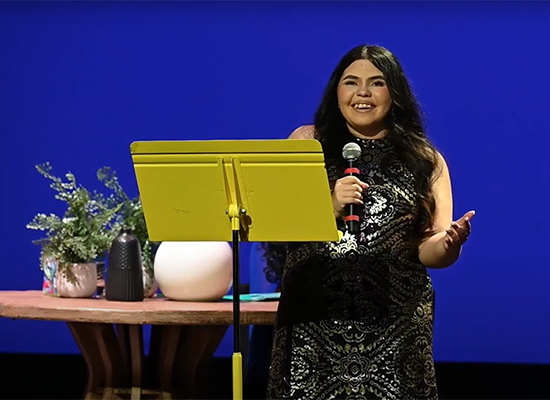
Acting allowed Izzy Gonzalez to break out of her shell and thrive while living with multiple disabilities
Izzy Gonzalez describes her childhood as “a storm” filled with severe illness, medical trauma and frightening diagnoses.
“As a child, I accepted that death was going to happen, and I just grew numb to that fact. I didn’t think I’d make it to high school,” recalled Izzy, now 20.
Izzy was born with VATER syndrome, a complex condition named for the body parts it affects: vertebrae, anus, trachea, esophagus and renal (kidney).
Her condition meant frequent surgeries, hospitalizations and appointments throughout her childhood.
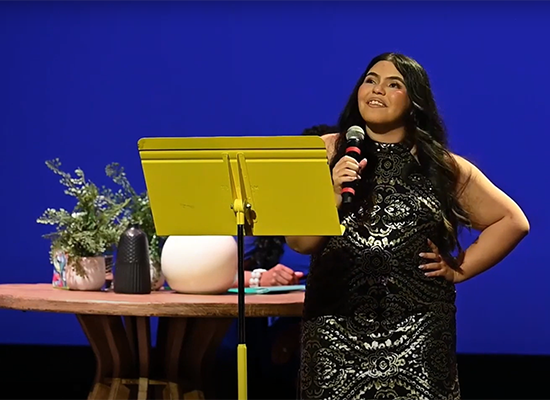
The isolation and uncertainty took a toll, especially as Izzy entered middle school. But when she accepted an invitation to join a local theater program for youth with disabilities, everything changed.
“I was in a tunnel for the longest time, but I found my light. Theater is my light,” Izzy said.
Today, Izzy is a college student studying theater and planning for a promising future.
She recently gave a moving speech detailing her journey with disability during “That’s What She Said 2024.” The event was a live storytelling performance featuring local women from the Champaign-Urbana community.
Izzy stood on stage during the Feb. 24 performance and read a letter to herself called “Love, Izzy.” In the letter, she speaks to her younger self at 10 years old. At that time, she was in a medically induced coma for 30 days due to a severe infection of influenza B.
“Even though you have been in and out of the hospital since birth, this is the toughest moment your body will ever face…” Izzy read aloud.
“I still feel in my heart the fear and doubt that we would never see a real sunset ever again. I’m here to tell you that you will wake up and you’ll see so many more sunsets. We made it a whole two decades, so much longer than we ever thought possible… In true Izzy fashion, we defy all the odds.”
You can watch Izzy read her powerful letter in full in the video below:
Fear, doubt and isolation
Izzy was born with no anus and only one kidney, which grew bigger to compensate for her kidney that didn’t develop. She also has scoliosis and is missing some of her vertebrae. Doctors initially told her family she’d never be able to walk.
Izzy was also born with a tracheoesophageal fistula (TEF), which meant there was an abnormal connection, or “tunnel” as Izzy calls it, between her esophagus and trachea (windpipe). She experienced frequent vomiting, acid reflux and difficulty breathing until her TEF was officially diagnosed at age 12.
Izzy’s family moved to central Illinois from California after her birth so she could receive treatment at Carle Foundation Hospital in Urbana.
She enrolled with the University of Illinois Chicago’s Division of Specialized Care for Children (DSCC) in 2005.
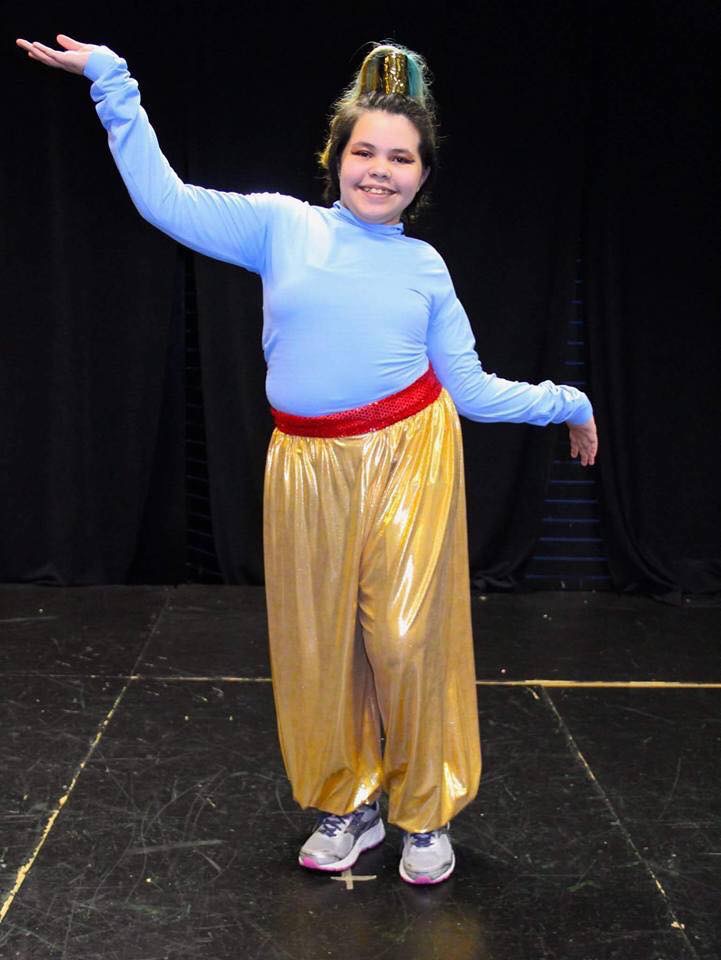
DSCC helped coordinate Izzy’s medical appointments among many different specialists and arranged travel and hotel stays for her family.
Izzy underwent several major surgeries to correct her scoliosis and TEF, among others. She also experienced severe illnesses due to her weakened immune system.
“They knew my name in the pediatric ward and that was just the life I was living,” Izzy recalled.
This life meant Izzy missed many days of school, including all of sixth grade, due to medical reasons. The time away from her peers made it hard for Izzy to connect socially.
“I was gone from school so much, people in middle school thought I was a new kid,” Izzy said. “I was so much of an introvert because I didn’t know how to talk to anyone. I was that person who specifically chose to sit by myself at a lunch table at the back of a lunchroom.”
One day, Izzy’s mom asked if she’d like to try the Champaign Urbana Theatre Company’s Penguin Project.
The Penguin Project is a national program that provides a supportive environment for children with disabilities to explore their creative talents in a community theater experience. Youth with disabilities are the artists and “peer mentors” without disabilities join them on stage.
Not knowing what she was agreeing to, Izzy replied “yes.”
“I was bored with life so much that I was questioning my existence. I was questioning why I was here,” Izzy said, noting she had fallen into a deep depression and thought about self-harm.
Izzy felt she had nothing to lose.
“No limits”
The Penguin Project brought unexpected hope and unlocked a new passion and excitement within her.
“When I fell into The Penguin Project, I thought, ‘This is fun! I get to socialize with people and meet people like me,’” she said. “It’s an amazing program. You get to socialize with so many people that you wouldn’t have met otherwise, and that’s when I really found my people.”
Izzy was 12 when she joined The Penguin Project and has stayed involved with it ever since.
“Theater essentially saved my life and altered the course of my entire life. It altered the course of my future,” she said. “I got to enjoy life. I got to enjoy existing. I remember that first year, I was just enjoying being alive and that’s something I could never repay back in a million years. And that’s why I love The Penguin Project so much.”
Izzy started to act in other local theater productions. She calls being on stage and playing different characters a fun and freeing experience.
“In the theater, we get to be whatever we want. There are no limits,” she said.
Izzy received a nomination for a best up and coming actor award from the Champaign Urbana Theatre Company for her 2017 portrayal of Wally Webb in the play “Our Town.”
Izzy also participated in the Illinois Miss Amazing program. Miss Amazing provides opportunities for girls and women with disabilities to share their abilities and ambitions. In 2018, she became the Illinois Miss Amazing Junior Teen Queen.
As she prepared to graduate high school, Izzy knew she wanted to pursue theater in college.
She decided to attend Parkland College in Champaign, where she is studying theater arts and focusing on acting. Izzy recently completed her fourth semester and says she’s gained invaluable experience with the different theater production roles.
She hopes to eventually transfer to Millikin University in Decatur and earn her Bachelor of Fine Arts in theater. She also wants to become a makeup artist to help financially support her acting goals.
“A bright future”
Izzy currently lives at home with her parents due to her medical needs. She is working on becoming more independent so she can live on her own. After 19 years as a DSCC participant, she left the program in March 2024 as she prepares to receive adult services.
As she enters adulthood, Izzy enjoys raising awareness and advocating for people with disabilities.
She encourages other youth with disabilities and special healthcare needs to have fun as much as possible.
“That’s what always got me through my hospital stays. I had fun. I knew I was being watched medically, and I knew I was going through sicknesses, but I still had fun. I was still a child,” she said “And I’d say to the parents, make it fun for your child, just to take their minds off of what’s happening. Give them activities to do.”
Izzy also stresses the importance of a positive mindset.
“If you have a pessimistic mentality than nothing good is going to come of that, and you’ll just feel bad the entire time. If you have a more optimistic mentality, you’ll be able to cope better,” she said. “Always try to live in the moment, no matter what the situation is.”
As Izzy looks back on the “storm” of her childhood, she is thankful for the support she’s received along the way from her parents and her sister as well as DSCC.
She’s also incredibly proud of how far she’s come.
As she eloquently spoke to her 10-year-old self in her “Love, Izzy” letter: “One thing you’ll find out is the word ‘failure’ doesn’t seem to be in our medical vocabulary…” Izzy said.
“I can’t wait for you to experience everything that’s to come, and I can’t wait to experience what’s to come. I know that we will have a bright future.”



